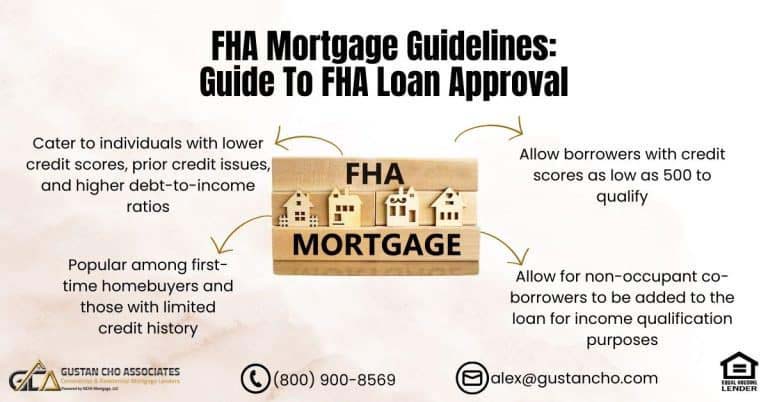Non-QM Loans for Real Estate Investors: A Smart Alternative to Hard Money in 2025
If you’re a real estate investor looking to buy a rental property, fix and flip a home, or grow your portfolio, you may have hit a wall with traditional lenders. Maybe the bank said no because you’re self-employed, don’t show enough income on paper, or own too many properties.
That’s where non-QM loans for real estate investors come in. These flexible, fast, and investor-friendly mortgages are changing the game in 2025.
In this guide, we’ll explain non-QM loans, how they compare to hard money loans, what options are available, and how you can get approved today with Gustan Cho Associates.
What Are Non-QM Loans for Real Estate Investors?
Non-QM stands for Non-Qualified Mortgage. These loans don’t follow the strict rules set by Fannie Mae or Freddie Mac. But that doesn’t mean they’re risky. In fact, they’re built for real estate investors who need more flexibility.
With non-QM loans for real estate investors, the lender looks at the value or cash flow of the property rather than your W2s, tax returns, or pay stubs. This is ideal for self-employed borrowers, house flippers, or landlords with multiple properties.
Non-QM Loans Made Easy for Real Estate Investors
Get approved fast—even with complex income, high DTI, or multiple properties.
Why Are Non-QM Loans Important for Investors?
Many real estate investors don’t fit the traditional loan box. Non-QM loans allow you to:
- Buy investment properties with alternative income documentation
- Close faster than conventional loans
- Use rental income to qualify
- Skip the tax return or W2 requirements
- Work around credit blemishes
If you’re trying to grow your portfolio or take advantage of a hot real estate deal, non-QM loans for real estate investors can be your best option.
How Are Non-QM Loans Different from Hard Money Loans?
Hard money loans are quick cash options from private lenders, but they come with a catch—they’re pretty pricey, often with interest rates hitting 12-15% or more. You’ll usually need to put down a big chunk of the property’s value, and these loans really only make sense if the property has a lot of equity to back it up.
On the flip side, non-QM loans for real estate investors can also get you that fast funding, but with better rates and more extended repayment periods. In 2024, you can expect NON-QM rates to be between 7% and 10%, depending on your credit score and how much you put down.
Here’s a quick comparison:
|
Feature |
NON-QM Loans |
Hard Money Loans |
|
Rate Range |
7% – 10% |
12% – 15% or higher |
|
Term |
30-year fixed or interest-only |
6 – 18 months |
|
Down Payment |
15% – 30% |
25% – 40% |
|
Qualifying Income |
Rental income or P&L |
Equity-based only |
|
Prepayment Penalty |
Often None or 1-3 years |
Usually None |
What Types of Non-QM Loans Are Available for Investors?
Gustan Cho Associates has a bunch of non-QM loans available for real estate investors in 2025, covering a variety of options:
1. DSCR Loans (Debt Service Coverage Ratio Loans)
DSCR loans, which stand for Debt Service Coverage Ratio loans, are a solid choice for landlords since they don’t ask for proof of income or a job. Instead, you qualify based on your property’s rental income. You can find loans with a minimum DSCR as low as 0.75, so you can make do with breaking even. Down payments start at 20%, and you’ll need a credit score of at least 620 to get in on it.
2. Bank Statement Loans
Bank statement loans are helpful for self-employed investors who might not show much income on their tax returns. Instead of dealing with the usual paperwork like tax returns or W2s, these loans let borrowers use 12 or 24 months of their personal or business bank statements. Depending on your credit score, you usually need to put down between 10% and 20%. This more laid-back approach makes bank statement loans a great option for anyone looking to get financing without all the typical document hassle.
3. Asset-Based Loans
Asset-based loans are a financial option for individuals with significant liquid assets but limited income. These loans do not require income verification, as lenders qualify borrowers based primarily on their cash or investment assets. This approach allows those with ample resources to secure funding without traditional income documentation.
4. No-Doc or Lite-Doc Investor Loans
No-Doc or Lite-Doc investor loans are mainly for seasoned investors with good credit who can put down a big chunk of money. These loans skip the whole income and employment verification hassle, making them appealing for people with solid finances. They do come with higher interest rates, but they let you close quickly, speeding up the investment process.
Each of these non-QM loans for real estate investors is designed to help you grow faster, invest smarter, and avoid traditional roadblocks.
Grow Your Real Estate Portfolio with Flexible Financing
No tax returns, no income limits—just smart lending for serious investors.
What Are the Requirements for Non-QM Loans for Real Estate Investors?
Requirements vary by product, but here are general guidelines:
- Credit Score: As low as 620, better rates at 680+
- Down Payment: Typically 20%–30%
- Property Type: SFR, condos, 2-4 units, multi-family, mixed-use, and more
- Loan Amount: Up to $5M or more
- Income Documentation: This depends on the program (DSCR, bank statements, etc.).
- Reserves: 3-12 months of mortgage payments, depending on loan size and risk
Real-Life Scenarios: How Investors Use Non-QM Loans
Case 1: DSCR Rental Loan Mark owns five rental properties and wants to buy a sixth. His tax returns don’t show enough income. Using a DSCR loan, Mark qualifies using only the rental income from the new property. He closes in under 21 days.
Case 2: Bank Statement Loan Samantha is a full-time house flipper. She deposits $25,000 monthly into her business account but writes off most of it. Her CPA prepares a P&L. She uses a 12-month bank statement loan to buy a new flip property.
Case 3: Asset-Based Loan Carlos recently sold a business and now invests in real estate. He has $700K in his brokerage account but no W2 income. He uses an asset-based non-QM loan to buy a 4-unit rental.
These examples show how non-QM loans for real estate investors offer practical solutions when banks say no.
How Fast Can You Close a Non-QM Loan?
Speed is one of the biggest benefits of non-QM loans for real estate investors. Depending on the appraisal timeline and property type, many investors close in 2-3 weeks.
At Gustan Cho Associates, our team specializes in fast closings with minimal red tape. We understand investor deals move quickly — and so do we.
Why Work with Gustan Cho Associates?
At Gustan Cho Associates, we focus on non-QM loans for real estate investors nationwide. Our team knows how to creatively structure deals and close them quickly. We work with:
- Fix-and-flip investors
- Buy-and-hold landlords
- Foreign nationals
- Self-employed borrowers
- Builders and developers
Whether buying your first rental or expanding a multi-property portfolio, we’ll help you get the funding you need — even when others say no.
Ready to Get Started?
Don’t let banks hold you back. If you’ve been turned down for a traditional mortgage or need fast, flexible financing for your next investment property, we can help.
Borrowers who need a five-star national mortgage company licensed in 50 states with no overlays and who are experts on non-QM loans for real estate investors, please contact us at 800-900-8569, text us for a faster response, or email us at gcho@gustancho.com.
Non-QM loans for real estate investors are one of the most powerful tools for today’s housing market. Get the funding you need to grow your portfolio and build wealth — without the headaches of traditional lending.
This blog about “Non-QM Loans for Real Estate Investors Made Easy” was updated on July 10th, 2025.
Frequently Asked Questions About Non–QM Loans for Real Estate Investors:
Q: What are Non-QM Loans for Real Estate Investors?
A: Non-QM loans for real estate investors are special mortgages that don’t follow the usual bank rules. They’re great if you’re self-employed, don’t show much income on taxes, or already own a few properties. These loans look more at the property than your job or pay stubs.
Q: Who Should Use Non-QM Loans for Real Estate Investors?
A: If you’re a house flipper, landlord, or someone with rental income who can’t get a regular loan, NON-QM loans for real estate investors are made for you. They’re also perfect if you’ve been turned down by the bank but have a solid deal.
Q: How are Non-QM Loans for Real Estate Investors Different from Hard Money Loans?
A: Hard money loans have higher rates, short terms, and big down payments. Non-QM loans for real estate investors offer better interest rates, longer terms (like 30 years), and more flexible rules. They’re easier on your wallet and still fast.
Q: Can I Qualify for Non-QM Loans for Real Estate Investors Without Showing Tax Returns?
A: Yes! Many NON-QM loans for real estate investors do not require tax returns or W-2 forms. You can qualify using bank statements, rental income, or assets.
Q: What Types of Non-QM Loans for Real Estate Investors are Available?
A: There are several types, including DSCR loans (based on rental income), bank statement loans, asset-based loans, and no-doc loans. Each is designed to help different kinds of investors qualify more easily.
Q: What Credit Score do I Need for Non-QM Loans for Real Estate Investors?
A: Most lenders look for a credit score of at least 620. However, better scores (like 680 or higher) may help you get a lower rate or smaller down payment.
Q: How Much Do I Need to Put Down for Non-QM Loans for Real Estate Investors?
A: You usually need a down payment of 20% to 30%, depending on the type of loan and your credit. Some programs may offer lower down payments for strong borrowers.
Q: How Fast Can I Close with Non-QM Loans for Real Estate Investors?
A: Many investors close in just 2–3 weeks. NON-QM loans for real estate investors are built for speed because they focus more on the property and less on your paperwork.
Q: Can I Use Non-QM Loans for Real Estate Investors to Buy a Short-Term Rental or Airbnb?
A: Yes! Many NON-QM loans for real estate investors allow you to use short-term rental income to qualify, especially with DSCR programs.
Q: Why Should I Choose Gustan Cho Associates for Non-QM Loans for Real Estate Investors?
A: Gustan Cho Associates is a five-star lender specializing in NON-QM loans for real estate investors. We close fast, handle tricky situations, and don’t have extra rules (overlays). We help you get approved even when banks say no.
Buy More Properties Without Traditional Roadblocks
Our non-QM loans help real estate investors scale fast with fewer restrictions.










